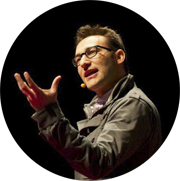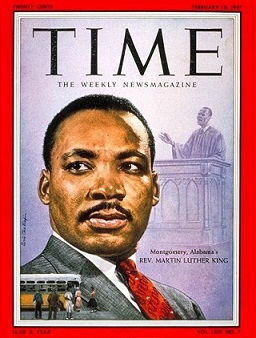Martin Luther King Leadership Lessons
 In September 2009, Simon Sinek (Simon Sinek), speaking at the TED conference , made, in my opinion, the best report on sales, in particular, and leadership in general. In it, he indirectly touched on IT evangelism , which is so characteristic of the marketing strategy of Apple and some other companies. In such an interpretation, successful companies answer with their product the question “why” and not “what”, unlike their failed colleagues. According to Simon, the main factor determining success is the law of diffusion of innovations or, in a different way, the diffusion of innovations.
In September 2009, Simon Sinek (Simon Sinek), speaking at the TED conference , made, in my opinion, the best report on sales, in particular, and leadership in general. In it, he indirectly touched on IT evangelism , which is so characteristic of the marketing strategy of Apple and some other companies. In such an interpretation, successful companies answer with their product the question “why” and not “what”, unlike their failed colleagues. According to Simon, the main factor determining success is the law of diffusion of innovations or, in a different way, the diffusion of innovations.This theory seeks to explain how, why, and at what speed new ideas and technologies spread through different cultures. She was popularized by the American sociologist Everett Rogers in 1962. Within the framework of the theory, it was assumed that in relation to new ideas, according to the order of adoption of innovations (on the X-axis chart this time), people can be divided into several categories:

- Innovators - 2.5% - enterprising, well-educated, have many sources of information, are more prone to risk.
- Early followers - 13.5% - social leaders, popular, with a good education, readily accept / try innovations, but are more cautious than innovators.
- The early majority, 34%, is prudent, more cautious than the early followers, but accepting the innovation earlier than the average follower has many informal social contacts.
- Later, the majority - 34% - skeptics, adopt innovation only when it has already been adopted by the majority, have a lower socio-economic status.
- The laggards - 16% - are traditionalists, do not like change, accept them only when they become the generally accepted norm, tradition; neighbors and friends are the main sources of information.
Developing the theory, Simon says that people do not buy what you do, they buy why, you do it. And what you do is just proving what you believe. As a successful example, he cites the activities of one of the most important historical figures for the entire existence of the United States, Martin Luther King. As a key figure in the civil rights movement for blacks, King was actively engaged in preaching activities, which resulted in incendiary charismatic speeches, which are still dismantled for quotations on the case and no. Some of his speeches are now considered classics of oratory.
')

In the summer of 1963, 250,000 people gathered in a square in Washington to hear Dr. King's speech. There was no mailing of invitations, there was no website where you could check the date. How was this possible? Dr. King, by no means, was in America the only person with outstanding oratorical abilities. He was not the only one who suffered from the morals of America from the period before the formation of civil rights, and if honestly some of his ideas were frankly bad, but he had a gift, a real gift of strategic genius.
He already realized that it was useless to appeal to rational motives if you want to ignite the masses. This in no way means that he himself suffered from a lack of rationality. At the level of his genius, the concepts of rationality and irrationality are closely intertwined. Thus, guided by quite rational motives, he appealed to the irrationality of human nature, to feelings, to faith and obsession. In his speeches you will not find concrete plans, and he never told people that he would have to change the country specifically, but spoke about what he believed in.
I have a dream , I have a dream, I have a dream - he said, and people who believed in the same things, perceived it, felt their involvement with it and told others about it. His elevation to the virtually sole “living banner” of the whole movement, like nothing else, shows us masterful mastery of him, the key qualities of strategic leadership.
One should not underestimate the importance of such qualities for modern leaders interested in strengthening strategic effectiveness in uncertain, complex and ambiguous conditions. Therefore, we will try to reflect and derive some rules implicitly formulated by this genius.
Anticipate opposition
Dr. King foresaw what was needed to achieve change. He understood that a marginal group of people with a low level of education and scant economic opportunities can only be strong by mass. As a good chess player, he thought a few moves ahead, starting with supporting local social formations and voter registration organizations, and coordinated the transport of a large number of blacks to polling stations. Thus, he outwitted the opposition, remaining within the framework of the law and the practice of non-violence.
Spit on authority and question the status quo
His vision of the world made him stand up for social justice, and confront the most flagrant violations of civil rights in the South. He was fearless in the fight against the arrogance of whites, knowing full well that he was playing with fire. This was shown by the brutal killings of other freedom fighters in the state of Mississippi. To achieve his goals, he often used unconventional tactical moves, including the famous Alabama boycott .
Use symbolic characters.
King very carefully approached the choice of Selma as a focal point for the escalation of the struggle for rights. This choice was based on an analysis of the local political scene, as well as various scenarios that might follow.
Selma was the center of the agricultural region (cotton, livestock, pecan nuts). During the American Civil War, tons of ammunition and Confederate warships were produced here. Divisions of the army of northerners, led by General J. Wilson, destroyed the military arsenal and factories, while burning almost the entire city.
His opposition movement has already been confronted with church explosions, lynching and violent beatings. Recognizing and interpreting the political background, the moral awakening of the North, and the changing social mores - King strategically redirected political forces at the local and national levels.
Weigh the risks
Dr. King and his team always calculated several options when choosing goals and tactics, from non-violent civil disobedience to provocations compromising segregation laws. Guided by an uncompromising vision of social justice, he always made calculated tactical decisions that took into account unforeseen consequences.
Build strong alliances
Martin King, even in his youth, was very clever in creating mutually beneficial alliances with local officials. He skillfully joined the powers that be, including President Johnson, when they slowly pushed society to accept the idea of changing the right to vote. This lengthy process pushed the most reckless politicians, especially Johnson, who was among the adherents of coarse political methods, back on track.
Learn and adapt
Dr. King and his colleagues faced multiple failures and surprises at the start. King was imprisoned 29 times in only one campaign in Birmingham. He empirically learned that no one, even the most perfect, plan does not withstand a collision with reality and requires constant corrections. Constantly evolving, King and his team were able to create a unique blend to create the required political pressure.
The above strategic leadership qualities have led to truly historic success and contain important leadership lessons, emphasizing the courage and perseverance necessary to change the world. Managers who would like to change their minds and overcome deeply rooted prejudices and prejudices in any industry should carefully study the biographies of such people, little by little, collecting the quintessence of leadership and leadership in general.
Martin Luther King said: “I have a dream, not a plan!” Listen to modern politicians with their comprehensive abstract plans, they do not inspire anyone, because there are formal leaders and those who really lead us. Formal leaders hold high positions in power, but the people who lead us are inspiring. These can be individuals or entire organizations. We follow those who lead us, not because we have to, but because we ourselves want. We follow them not for their sake, but for our own sake. It is those who start with “why” who have the ability to inspire others or find others who inspire them.
Source: https://habr.com/ru/post/286332/
All Articles